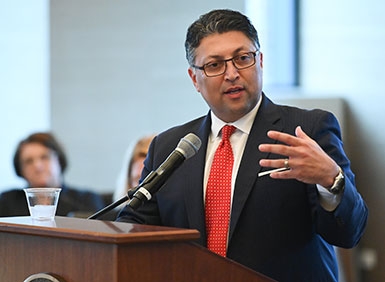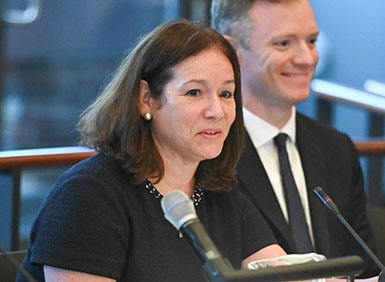At PCCE event, DOJ’s Makan Delrahim announces new policy for incentivizing antitrust compliance
The US Department of Justice (DOJ) will give more weight to compliance programs in its antitrust enforcement, announced Makan Delrahim, assistant attorney general in the DOJ’s Antitrust Division in a speech delivered on July 11 in NYU Law’s Furman Hall. His remarks, titled “Wind of Change: A New Model for Incentivizing Antitrust Compliance Programs,” were part of a broader event on corporate compliance hosted by the Law School’s Program on Corporate Compliance and Enforcement.
After Delrahim’s speech, Charles L. Denison Professor of Law Harry First moderated a panel that included Robin Adelstein ’87, the head of antitrust and competition at Norton Rose Fulbright; Andrew Finch, principal deputy assistant attorney general in the DOJ’s antitrust division; Renate Hesse, a partner at Sullivan & Cromwell; Jonathan Jacobson, a partner at Wilson Sonsini Goodrich & Rosati; and Richard Powers, deputy assistant attorney general for criminal enforcement in the DOJ’s antitrust division.
Robust compliance programs play a role in preventing crimes or detecting violations early, reducing the need for enforcement activity and minimizing harm to consumers, said Delrahim.
Under the Antitrust Division’s previous corporate leniency policy, the division granted immunity to the first company to report an antitrust violation, but sought guilty pleas from other companies involved, with the possibility of penalty reductions if the accused companies cooperated with the investigation.
With the division’s new approach, companies that don’t “win the race for leniency” have the opportunity to negotiate a deferred prosecution agreement if prosecutors determine that the corporations’ compliance programs are well designed and being applied in good faith, among other factors, Delrahim said.
Delrahim added that the new approach should not be misconstrued as a pass for corporate misconduct. “The more we do to recognize efforts to institute, strengthen, and improve compliance programs—consistent with department policy and the sentencing guidelines—the stronger a company’s incentives are to invest in compliance in the first place, and to incentivize others to do the same,” he said.
The panelists discussed the division’s new policy and other topics, including corporate citizenship, antitrust compliance, and criminal enforcement policy.
“It’s heartening and gratifying to hear that credit will be given for an effective compliance program,” Adelstein said. “Many of us have worked hard to ensure our companies engage in compliant behavior, drafting and redrafting antitrust policies, writing and rewriting codes of conduct, engaging in training…and making sure that the trainings are done in a way that’s relevant to the company’s business and to the industry.”
Watch video of Assistant Attorney General Makan Delrahim’s remarks:
Posted 8/5/19



